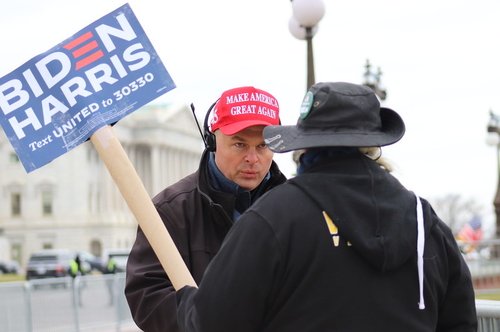
From the Center
The concept of an “October Surprise” is a relatively modern one in American politics. Back in the 1980 campaign, Ronald Reagan’s advisors became concerned that the White House might attempt to orchestrate a release of the Americans held hostage in Iran before the election to boost President Carter’s re-election hopes.
Since then, the presidential campaigns of both parties have lived in fear of unforeseen real-world incidents that could impact the election’s outcome in unanticipated ways. There will always be unexpected news occurring over any 31-day period. But most of these “surprises” end up being campaign-generated news that don’t do much to alter the overall trajectory of the race.
This year could be different. At one minute after midnight on October 1, there were already three separate and distinct events taking place in the world, any one of which could have a determinative influence on a closely-contested election. The most potentially impactful of the three was the dockworkers’ strike at both Atlantic and Gulf of Mexico ports, which had the potentially to paralyze the nation’s economy just as early voting was starting in key states. But the stoppage also put the Biden Administration – and especially Harris – in an extremely precarious political situation, forced to choose between widespread economic discomfort for much of the country or risking a rupture with organized labor by leaning too hard on the union to settle.
Biden resisted considerable pressure to force the dockworkers back to their jobs, relied instead on Transportation Secretary Pete Buttigieg and other administration officials to encourage negotiations between the workers and their employers. They ultimately achieved a settlement within a matter of days, avoiding both economic and political disaster. Neither Biden nor Harris will gain much credit for the narrowly-averted catastrophe, but both dodged a bullet that could have been fatal to Harris’ prospects.
The second October surprise actually began in October 2023, when Hamas terrorists murdered more than 1000 Israelis and took more than 250 hostages. Since then, both Biden and Harris have faced a deep rupture within the Democratic Party over the U.S. role in resolving the conflict. But the crisis has taken a dramatic turn in recent days, as Israel has shifted its focus from the fight in Gaza to a military offensive against Hezbollah in Lebanon and direct engagement with Iran. Israel’s battle with Hamas has been the cause of immense political difficulty for both Biden and Harris, and this new violence has intensified feelings among both American Jews and Muslims, both of whom are key Democratic constituencies.
But the most damaging of these real-world interruptions is undoubtedly the devastation caused by Hurricane Helene’s path across the southeastern United States. The incalculable damage caused by the storm to the lives and livelihoods of millions of residents of six states would be horrific under any circumstances, but both Helene’s timing and its targets have created a historically unprecedented political conflagration as well. Two of the seven swing states that will decide this election – Georgia and North Carolina – lay squarely in the storm’s path, and they have borne a disproportionate amount of the destruction that has taken place. There has never been an occasion in the nation’s history in which two heavily contested states were hit by a natural disaster so close to an election.
Trump and Harris have both raced to demonstrate their support for the hurricane’s victims and attempted to display the leadership that Americans expect from their elected representatives in times of crisis. The first several days of photo opportunities and interviews has not given a clear advantage to either of them. But Helene’s most lasting political impact is less likely to be the public’s impressions of the candidates, but the much more tangible effect of the voting process itself.
Millions of the region’s residents have had their lives turned upside down, many without water, power or shelter. Because repair efforts are almost always more difficult in outlying areas, the rural and small towns populated by large numbers of Trump voters are unlikely to have services restored as quickly as the urban centers that lean Democratic. Rules regarding mail ballots, voting deadlines and polling locations will be heatedly debated both before and after November 5, and an already contentious post-election brawl is about to become even more divisive.
The physical well-being of the people of western North Carolina, southern Georgia and four other states obviously come first. But the storm’s aftermath may produce yet another October surprise – one that plays a determinative role in electing the next president.
Want to talk about this topic more? Join Dan for his webinar, “The Dan Schnur Political Report." And read more of Dan’s writing at www.danschnurpolitics.com.
Dan Schnur is a Professor at the University of California – Berkeley, Pepperdine University, and the University of Southern California, where he teaches courses in politics, communications and leadership. Dan is a No Party Preference voter, but previously worked on four presidential and three gubernatorial campaigns, serving as the national Director of Communications for the 2000 presidential campaign of U.S. Senator John McCain and the chief media spokesman for California Governor Pete Wilson. He has a Center bias.
This piece was reviewed and edited by Clare Ashcraft, Bridging Coordinator & Media Analyst (Center bias).











